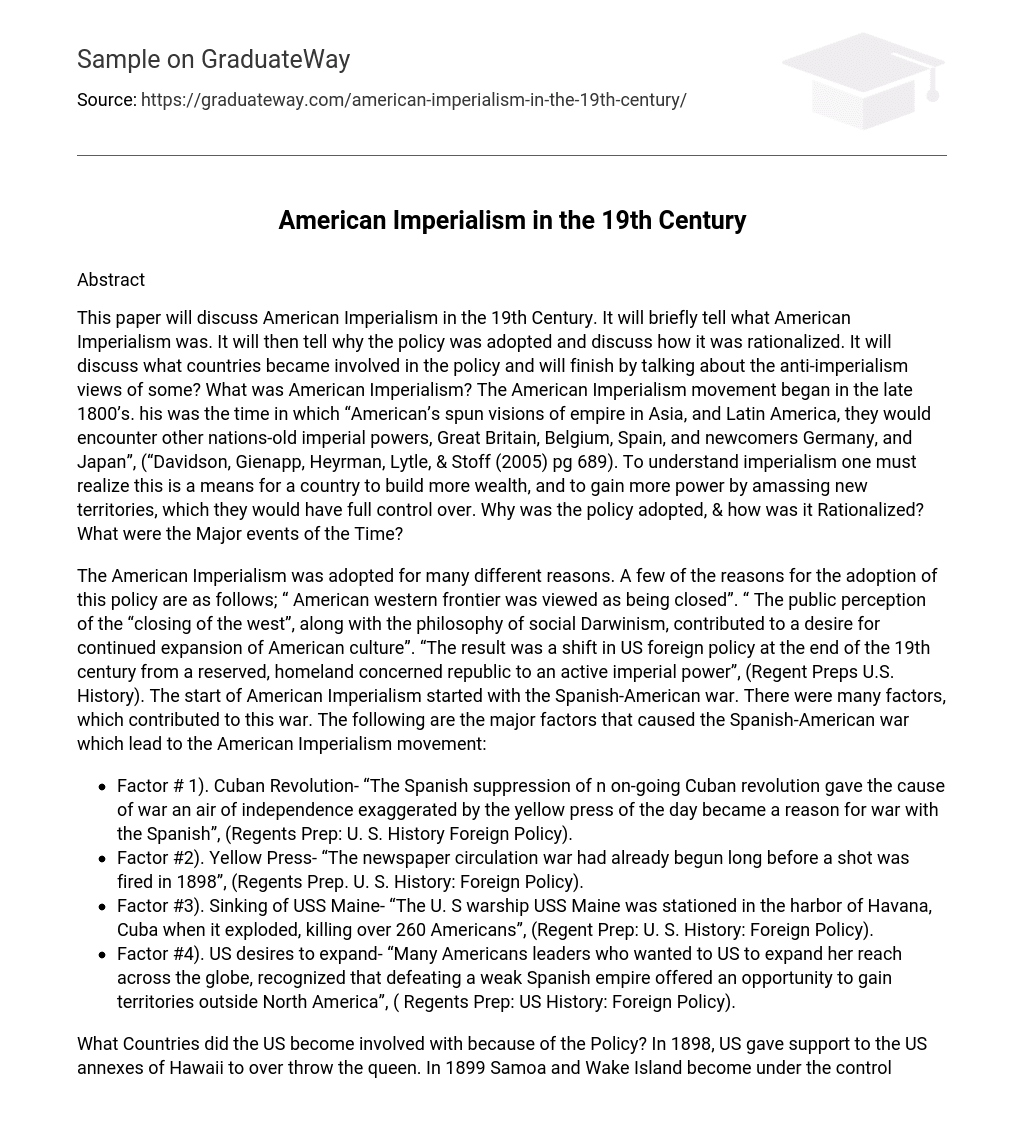Abstract
This paper will discuss American Imperialism in the 19th Century. It will briefly tell what American Imperialism was. It will then tell why the policy was adopted and discuss how it was rationalized. It will discuss what countries became involved in the policy and will finish by talking about the anti-imperialism views of some? What was American Imperialism? The American Imperialism movement began in the late 1800’s. his was the time in which “American’s spun visions of empire in Asia, and Latin America, they would encounter other nations-old imperial powers, Great Britain, Belgium, Spain, and newcomers Germany, and Japan”, (“Davidson, Gienapp, Heyrman, Lytle, & Stoff (2005) pg 689). To understand imperialism one must realize this is a means for a country to build more wealth, and to gain more power by amassing new territories, which they would have full control over. Why was the policy adopted, & how was it Rationalized? What were the Major events of the Time?
The American Imperialism was adopted for many different reasons. A few of the reasons for the adoption of this policy are as follows; “ American western frontier was viewed as being closed”. “ The public perception of the “closing of the west”, along with the philosophy of social Darwinism, contributed to a desire for continued expansion of American culture”. “The result was a shift in US foreign policy at the end of the 19th century from a reserved, homeland concerned republic to an active imperial power”, (Regent Preps U.S. History). The start of American Imperialism started with the Spanish-American war. There were many factors, which contributed to this war. The following are the major factors that caused the Spanish-American war which lead to the American Imperialism movement:
- Factor # 1). Cuban Revolution- “The Spanish suppression of n on-going Cuban revolution gave the cause of war an air of independence exaggerated by the yellow press of the day became a reason for war with the Spanish”, (Regents Prep: U. S. History Foreign Policy).
- Factor #2). Yellow Press- “The newspaper circulation war had already begun long before a shot was fired in 1898”, (Regents Prep. U. S. History: Foreign Policy).
- Factor #3). Sinking of USS Maine- “The U. S warship USS Maine was stationed in the harbor of Havana, Cuba when it exploded, killing over 260 Americans”, (Regent Prep: U. S. History: Foreign Policy).
- Factor #4). US desires to expand- “Many Americans leaders who wanted to US to expand her reach across the globe, recognized that defeating a weak Spanish empire offered an opportunity to gain territories outside North America”, ( Regents Prep: US History: Foreign Policy).
What Countries did the US become involved with because of the Policy? In 1898, US gave support to the US annexes of Hawaii to over throw the queen. In 1899 Samoa and Wake Island become under the control of the US. In 1903, the US financed the Panamanian Revolution against Columbia and gained Panama Canal Zone. In 1917, Denmark sold the Virgin Islands to the US. Also in 1898, the US gained control of the Philippines, Guam, & Pueblo Rico, (Proquest). The US gained all control of the countries listed above after the war between the Spanish and the Americans.
The United States had full power of all these countries and ruled them as they saw fit. However, there were people and organizations, which did not approve or condone the actions of the US concerning imperialism. The following are the views of the anti-imperialist movement. Anti-Imperialism League This group was founded in 1899. Two of the nation’s most respected citizens brought about this foundation. Their names were Andrew Carnegie and William James, (Modern History Source). The members of this group believed that imperialism was militias and immoral to the pursuit of liberty and freedom o the constitution of the United States, which was set forth by the ancestors of this great Nation. “We demand the immediate cessation of war against liberty, begun by Spain and continued by us”, (Modern History Source Book). The anti imperialist further state, “The United States have always protested against the doctrine of international law which permits the subjugation of the weak by the strong, a self govornoring state cannot accept sovereignty over an unwilling people”, (Modern History Source Book). Foreign Policy going into 20th Century
The imperialism policy ran well into the 20th century. It was still going strong between 1817-1820. This student personally feels imperialism is still in use today in the US. It may not be as flagger as it was in the 20th century waiting to make a full recovery. Just look at the war in Iraq. Can this be called imperialism? This student feels it is. Conclusion This paper has discussed what imperialism is. It discussed why the policy was adopted. It gives information on how it was rationalized and what the major events of that time were.
This paper also gives detailed factors on the Spanish American war, which lead the US to adopt imperialism. This paper gives some of the countries which the US became involved with due to the imperialism policy, and gives a few facts on the anti imperialism league, and the views of the members of this organization about the policy. Finally, this paper discusses the policy as it pushed into the 20th century.
References
- Harrington, H, Fred. (Sept. , 1935).
- The Anti-Imperialist Movement in the United States, pp. 211-230. Retrieved on June 16, 2010 from Http://www. jstor. org/stable/1898467. Murphy. , E. , (2009).
- Women’s Anti-imperialism, “The White Man’s Burden“, and the Philippine-American War: Theorizing Masculinity Ambivalence in Protest. Gender & Society, 23(2), 244. Retrieved June 16, 2010 from research Library. (Document ID: 1679787541).
- Regents Preps: US History: Foreign Policy. Retrieved June 16, 2010 from Http://regentsprep. org/regents/ushisgov/themes/foreignpolicy/imperialism. htm. Davidson,Gienapp, Heyrman, Lytle, & Stoff. (2005). Nation of Nations, A





